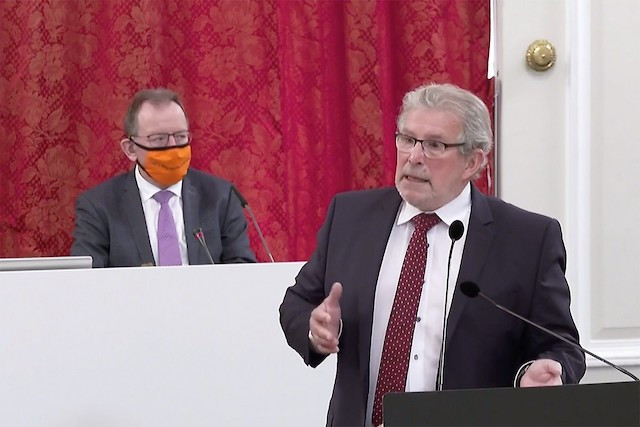“Nothing works the way it should,” said opposition MP Claude Wiseler (CSV) during his remarks. He said the government should have acted sooner and more coherently. Prime minister Xavier Bettel (DP) already on 31 October said the government was preparing contingency measures should virus numbers not go down but then waited until 23 November to finally go ahead with the plans.
Under the new rules, households can only welcome two other people who live together. But Wiseler questioned the logic, saying a family of three wouldn’t be able to visit their grandparents but the grandparents would be able to visit the other way around.
Health minister Paulette Lenert (LSAP) acknowledged the inconsistency but justified it by wanting to limit family visits as much as possible since they represent a large source of infections. She was backed by speakers from her party, the DP and déi Gréng who insisted that in principle there shouldn’t be any family visits unless needed, for example to care for relatives.
Anyone voting against the rules, “doesn’t understand the gravity of the situation,” said MP Georges Engel (LSAP). Only by implementing a complete lockdown could inconsistencies be avoided, he said.
Wiseler--along with other MPs--demanded to see more scientific evidence to explain the measures proposed as well as an analysis of the effectiveness of measures already implemented, such as the nightly curfew that has been extended until 15 December with the new law.
“The measures taken need to be understood and perceived as logical” to be accepted by society, Wiseler said. Lenert said there wasn’t enough scientific data yet but that numbers in Luxembourg had stabilised since the last round of measures. Similar results had been observed in other countries with comparable restrictions, she said.
“Common aim”
“The rules have changed 20 times since 16 March,” said MP Marc Baum of déi Lénk, adding that the public prosecutor and police had said some measures were difficult to patrol, such as limits of visitors to large shops or the wearing of masks in public spaces that aren’t indoors.
Baum criticised the decision to close down company cafeterias, including those for hospital staff, while cafeterias in schools can stay open. While the debate was still ongoing, hospitals received a message saying their cafeterias could remain open for staff, read aloud by a member of the CSV, which Lenert said she wasn’t aware of and therefore said she couldn’t comment on.
The ministry on Thursday specified that it had not sent the email in question and maintained that all staff cafeterias, including those at hospitals, would be able to provide take-out meals only, as is the case for restaurants.
Other MPs also tore into the government over exceptions made for schools. “While you cannot swim some laps by yourself, an entire school class can jump into the pool,” said MP Marc Goergen (Pirate Party).
Even from within the parliamentary majority there was some criticism. MP Josée Lorsché urged the government to reconsider closing cinemas, theatres and other cultural venues where people had observed distancing and the mandatory wearing of masks.
This stands in contrast to churches and places of worship remaining open. Lorsché said she did not wish for those to close as well, but voiced support for cultural organisations who on 25 November had sent a letter to the government to review its approach.
MPs debated the new laws for more than four hours. “We have a common aim,” said Bettel about the discussion despite the large divergences. The 31 MPs of the parliamentary majority voted to implement the partial lockdown starting 26 November. The 29 MPs from four opposition parties voted against the laws.
This article was updated on 26 November at 12pm, adding comments from the health ministry about the email sent to hospitals about staff cafeterias.
